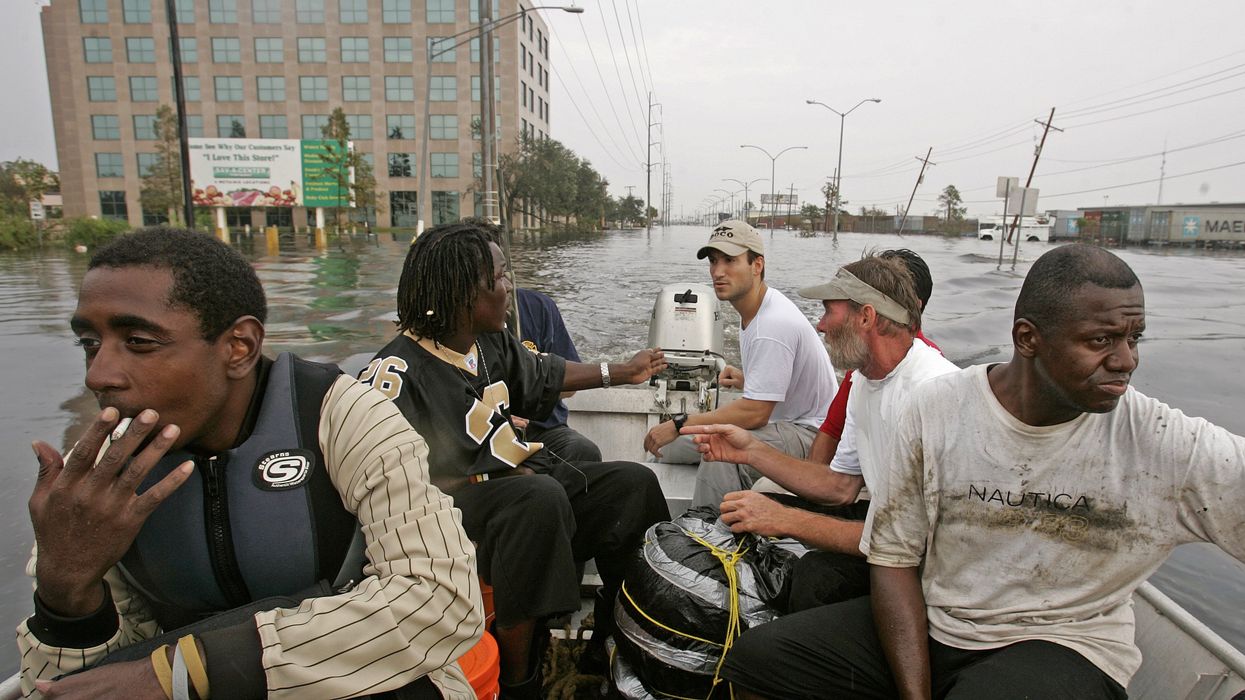Ratcliff, who serves on the Commission on Disability Issues and the Renter’s Commission in Ann Arbor., Mich., is a vice chair of the Washtenaw County Democratic Party’s Communications Committee. Ratcliff is a public voices fellow of The OpEd Project and Yale Program on Climate Change Communication.
From the hands that laid the foundation of this country’s infrastructure to the spirit that endured centuries of oppression, Black Americans have long been the backbone of this nation. Black communities continue to be centers of resilience and determination. As climate change increasingly threatens our homes and communities, it’s imperative that we protect and preserve what we've built for future generations.
Historically, Black communities have been positioned in environmentally compromised zones, often near polluting industries. Today these communities face dual threats: historical neglect and the frontline impacts of environmental disasters. Their resilience is tested by inadequate resources and support.
When Black communities face disasters, having trained members on the ground can be the difference between life and death. Some of the benefit comes from enhanced preparedness, the security of efficient and safe responses, and creating a resilient community. There's also the peace of mind that comes from knowing trained community members are ready to act, provide support and complement professional responders when disaster strikes.
However, there’s a critical gap in readiness and community engagement in the Black community. According to the Federal Emergency Management Agency’s 2023 National Household Survey on Disaster Preparedness, less than 60 percent of Black respondents believed that “preparing can help in a disaster and were confident in their ability to prepare.” Even more alarmingly, less than 17 percent reported getting involved in their community and less than 25 percent had practiced emergency drills or habits. This gap highlights the critical need for concerted efforts in strengthening disaster preparedness and resilience within Black communities.
Even though Black communities bear the brunt of environmental threats, Black organizations are notably absent from disaster management initiatives. Many overlook comprehensive disaster training. The NAACP launched a Disaster Equity Toolkit in 2018, for example, but implementation was never made a mandatory chapter action, and the organization hasn’t trained all chapters in areas with increasing climate-change-caused disasters.
To provide that peace of mind, the prominent national organizations that claim to lead in the Black community need to step up. Groups like the National Urban League and Black Lives Matter, with their extensive networks and resources, should be actively pursuing funding from Black businesses and entrepreneurs and reinvesting in the grassroots organizations working tirelessly on the front lines.
This isn’t just about financial contributions; it's about safeguarding our communities and ensuring that they are armed with the resources and knowledge to respond to any disaster. We must champion equitable investments in “climate-proofing” our communities.
Beyond historically vulnerable Black communities, it's also crucial to recognize how climate change is affecting the increasing Black populations in exurbs and suburbs across the country. They find themselves unprepared and often overlooked when disaster hits. Factors such as wage gaps, underemployment, underbanking and being underinsured also complicate our recovery from disasters, further underscoring the need for Black organizations to spearhead preparedness and mitigation efforts.
The Black community must unite to protect against the effects of natural disasters. By joining forces with organizations like National Voluntary Organizations Active in Disaster, Community Emergency Response Teams and the Medical Reserve Corps, we can fortify our recovery. Affiliation with VOAD, for example, grants seamless access to disaster-stricken areas, ensuring organized relief efforts. With CERT training, Black neighbors can transform into first responders, prepared to assist when professional help is delayed.
By getting involved with these groups, Black professional organizations like the International Association of Black Professional Firefighters, National Association of Black School Social Workers and the Association of Black Psychologists could help deliver culturally sensitive trauma support and mold an emergency management system that feels like us.
By allying with FEMA and Department of Health and Human Services, both of which have demonstrated commitment to shoring up community resilience and environmental justice under the Biden-Harris administration, Black organizations can bridge the resource gap between government agencies and community members. They can lobby for programs like CERT and MRC to receive full federal funding and for states to invest adequately in VOAD members. For instance, Michigan's decision to provide a mere $5,000 grant to organizations is insufficient. But a public outcry, particularly from Black-led organizations, never came.
Of course, readiness extends beyond immediate response. It’s rooted in ongoing education, advocacy and preparedness that evolves with environmental challenges. Consistent community involvement and strategy updates will ensure our communities remain agile and fortified against climate change’s unpredictable impacts.
It's time for the organizations that represent us to act. Our unity, determination and resilience are our strengths. History has shown our collective power. Let's harness that energy to ensure a future where Black communities are prepared for any storm. We must lobby, rally and influence the narrative. When disasters strike, let's ensure our community stands united and strong.



















Trump & Hegseth gave Mark Kelly a huge 2028 gift